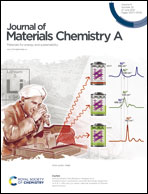Highly elastic and mechanically robust polymer electrolytes with high ionic conductivity and adhesiveness for high-performance lithium metal batteries†
Abstract
Due to the superior processability as well as readily-regulated mechanical and interfacial properties, polymer electrolytes are promising alternatives to inorganic solid electrolytes for lithium metal batteries (LMBs). However, polymer electrolytes that fulfill the requirements for application in LMBs are still quite rare. Herein, we report a highly stretchable and elastic, mechanically robust, and adhesive polymer electrolyte possessing high ionic conductivity. The polymer electrolyte was fabricated by in situ incorporation of lithium salts in the elastomeric polymer network of polyethylene oxide (PEO), wherein the PEO chains are simultaneously crosslinked by covalent and noncovalent bonds. Such a structural feature effectively hinders crystallization of the PEO chains and endows the polymer electrolyte with excellent elastic self-recovery and high mechanical robustness. The polymer electrolyte exhibits a room-temperature ionic conductivity as high as 4.8 × 10−4 S cm−1 and good adhesiveness to the electrodes of LMBs. The excellent elastic self-recovery in combination with high robustness and adhesiveness of the polymer electrolyte gives rise to the self-adaptive and tightly bonded electrolyte–electrode interfaces in an LMB. As a result, the polymer electrolyte can significantly suppress the Li dendrite growth and lower the interfacial resistance in the LMB. The LiFePO4‖Li battery assembled with the polymer electrolyte can be stably cycled for 450 cycles at 0.5C at room temperature and deliver steady and high discharge capacity of ca. 133.0 mA h g−1. The as-developed polymer electrolyte shows not only promise for application in high-performance LMBs but also high potential as an elastic electrolyte for stretchable lithium-ion batteries.



 Please wait while we load your content...
Please wait while we load your content...